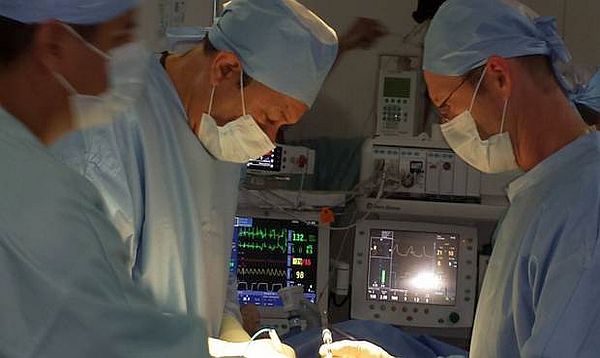Guadalajara, Mexico - A family vacation led to a mission to help the less fortunate.
Two years ago, Dr. Dennis Cramer was visiting Guadalajara, Mexico, his mom’s birthplace where he has many family members. Walking through the city and admiring the colonial structures, the Riverside, California neurosurgeon said it pained his heart to see so many people in need.He embarked on a quest to offer quality medical services to the city’s poorest residents.
"It is easy to forget that many others around the world do not have access to live-saving treatments like we do here in the United States," Cramer said in an October interview.
Cramer, 40, is a neurosurgeon at the Haider Spine Center in Riverside. He also works at the Riverside County Regional Medical Center in Moreno Valley, California.
On that trip to Guadalajara, Cramer walked into two hospitals in an effort to get support for providing his services. He was looked at with suspicion and rejected by doctors who questioned his motives.
At the third hospital he visited, he met Dr. Miguel Ochoa Plascencia, a neurosurgeon at Hospital Civil de Guadalajara Fray Antonio Alcalde, the county hospital in Guadalajara. Ochoa was receptive and agreed to work with Cramer to make his plan a reality.
After returning home from the trip, Cramer started figuring out how to transport the instruments and equipment needed for major spinal surgery. In the United States, a hospital stay for spinal fusion surgeries he wanted to perform in Mexico can average $150,000 to $200,000.
"Surgical implants alone cost more than $50,000," Cramer said. "The surgery is beyond the reach of most people in Mexico."
"Who gets it done? No one," he said.
 |
Cramer contacted Integra LifeSciences Corporation, a worldwide medical technology company headquartered in New Jersey. After months of letters, emails, paperwork, and meetings, he secured an $850,000 donation from Integra in the form of spinal implants and equipment.
"We’re very pleased to have had the opportunity to support Dr. Cramer’s Mission to Mexico through our donation of spinal implants," said Brian Larkin, Integra’s president of global spine and orthobiologics, in a written statement."Last year, Integra donated products worth almost $3.5 million to medical missions, and we’re very proud that we could continue to make a difference in the lives of those who do not have access to the kind of care we frequently take for granted."
Cramer worked closely with Ochoa to get the necessary permits and documents to transport the equipment to Mexico.
Cramer also received help from the Children’s Spine Foundation, a nonprofit established in 1994 to provide spinal care to disadvantaged children. He said the foundation provided airfare and hotel accommodations for himself, two other doctors, as well as a spinal implant technician, and engineer from Integra who went on the trip.
After two years of work, Cramer finally had everything in order.
In Mexico, Ochoa selected a handful of candidates from the large number of patients who needed spinal operations.
Cramer arrived in Guadalajara on September 22nd. He was accompanied by Dr. Thomas T. Haider, a spine surgeon who established the Haider Spine Center in 1992, and Dr. Brian Keyes, an anesthesiologist at the county medical center.
"I was so impressed with the altruism of Dr. Cramer and the fact that he wasn’t doing this for any financial gain," said Keyes, 42, who works with Cramer at the county hospital. "It was so nice we were able to provide a service that these people would never have received otherwise."
The team completed three major scoliosis surgeries during the three-day visit.
 |
One patient was a 14-year-old boy who was born with Duchenne muscular dystrophy, a congenital disease that results in muscle degeneration. His spinal deformity was so severe that, if left untreated, would have affected his lung capacity, causing breathing difficulties and eventual death, Cramer said.
They also operated on a 7-year-old girl who had a genetic disease called spinal muscular atrophy. She had weakness in her legs and a large curve in her back that severely limited her ability to stand or sit, he said.
The team also treated a 31-year-old man who was diagnosed with scoliosis as a teen. The man, a sheep herder, was unable to do his job because he couldn’t stand up straight or move his left leg. The surgery allowed him to regain his leg strength, Cramer said.
Cramer said he stays in touch with Dr. Ochoa on the status of the patients. He hopes to make the trip an annual event.
"The patients are all doing well and their condition is improving and that is all I can ask for," he said. "It was very rewarding to do something small to help these unfortunate people."
Original Story


